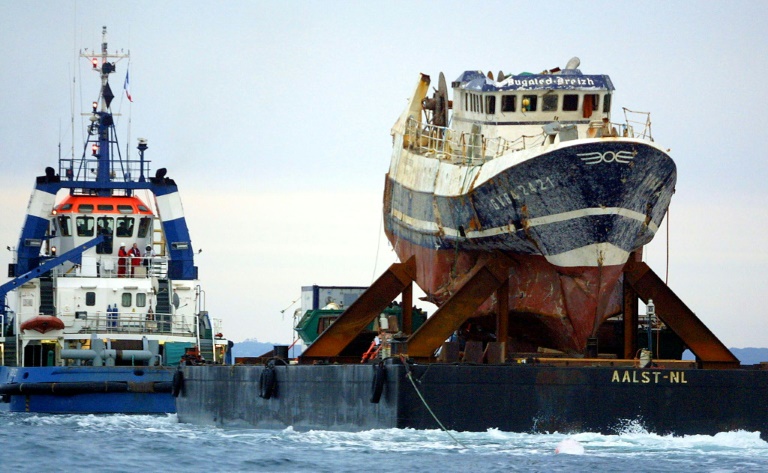A coroner’s inquest opened in London on Monday into the mysterious sinking of a French fishing trawler 17 years ago, which the victims’ families say was caused by a submarine.
The Bugaled Breizh, which operated out of the Finistere region of northwest France, went down off the British coast in less than a minute in relatively good weather on January 15, 2004.
The ship’s crew of five French nationals — Yves Gloaguen, Pascal Le Floch, Georges Lemetayer, Patrick Gloaguen, and Eric Guillamet — all perished in the tragedy.
The hearing, which is expected to last for three weeks, only relates to the deaths of Yves Gloaguen and Le Floch, as their bodies were found by UK search and rescue.
The body of Patrick Glouagen was discovered in the wreck during a salvage operations but those of Georges Lemetayer and Eric Guillamet have never been found.
French courts spent years investigating the sinking, which took place near where NATO and Royal Navy exercises were being held, but there has never been a full explanation about what happened.
“If the British Ministry of Defence or NATO says, ‘we did cover up things, we apologise and we’ll sort it out’, I’ll go home, I won’t bother anyone and you’ll never hear from me again,” said Georges Lemetayer’s son, Thierry, before the hearing.
Among those expected to give evidence are submarine commanders from the Royal Navy and Dutch navy, as well as seamen, rescuers and maritime experts.
– ‘Great hope’ –
The victims’ families have insisted since the sinking that either a British or US submarine got caught in the boat’s nets and dragged it down.
The men’s families have long awaited the coroner’s inquest, held in England and Wales in the event of a sudden or unexplained death, to establish the causes and circumstances on the balance of probability.
They hope it will endorse their version of events, after lengthy proceedings in France were inconclusive.
Lawyer Dominique Tricaud, who represents the children of Lemetayer, told AFP the proceedings “give us very great hope”.
“It will get to the bottom of things and the families, who have never given up, have never had such great hope,” he added.
“The families think that the (British submarine) HMS Turbulent was responsible for the sinking and are waiting for the trial to prove it.
“They’re not out for revenge but can’t grieve on a state lie.”
– ‘Full and fair’ probe –
The former commander of HMS Turbulent, Captain Andrew Coles, will give evidence on October 12 about the vessel’s location on the day the Bugaled Breizh went down.
A senior officer from the Dutch navy’s Dolfijn submarine, which is known to have been in the area at the time as part of a NATO training exercise, will also give evidence.
Britain’s Ministry of Defence and the Royal Navy have both denied claims that one of its submarines was involved in the sinking.
In 2006, the French Marine Accident Bureau concluded that the sinking was an accident, most likely caused by one of the boat’s trawler net cables snagging on the seafloor.
Other scenarios, such as a collision with a freighter, have been ruled out.
The French probe ended after an appeal in June 2016, when it failed to prove definitively whether the trawler sank in a sea accident or whether a submarine hooked onto one of its cables.
The inquest into Yves Gloaguen and Pascal Le Floch’s deaths began in Cornwall in 2020 but was adjourned due to Covid-19 restrictions and transferred to London.
At a March hearing, judge Nigel Lickley spoke to the fishermen’s families via video link, promising to “carry out a full, rigorous and fair investigation”.
Lickley also said the inquest had been informed by the Ministry of Defence that “no non-allied submarines” were present at the time of the sinking.










